#* character analysis
Text
man laios and toshiro's/shuro's dynamic is incredibly compelling to me on multiple levels
when you look at them, you can see the cultural and personal barriers that drive almost every single aspect of their relationship, both positively and negatively. laios is incredibly outspoken and driven by his passions, which he expresses freely even in the face of annoyance and/or criticism- he's allowed to be as authentically himself as he pleases, and it's this drive that allows him and the others to survive as long as they have, especially due to the fact that these passions and interests are intertwined with his skills as a dungeon diver. toshiro, in contrast, is incredibly reserved, not only due to his eastern upbringing but also his status as nobility- a combo of cultures that both demand that one save face, to avoid conflict at any cost, even at the expense of one's own feelings and individuality. this, in turn, has made toshiro the perfect samurai, as he's politely-spoken, agreeable, and an honorable, skilled man. both are also incredibly devoted to falin on different levels, having come to accomplish the same mission of her rescue despite drifting apart from the party.
on the flipside, it's these same strengths that cause them to clash- laios is outspoken but unable to truly decipher the emotions of others, leading to a lot of false assumptions and frustration from those who interact with him. toshiro is stoic but to the point of complacency, leading to a aggressively neutral disposition that's ushered by the needs and wants of others, rather than himself. neither man truly knows where they stand with the people important to them in their lives, and hold the ones that they do know how they feel with a fierce admiration expressed in ways that aren't always traditional.
in the end, they both share a growing feeling of isolation from other people that comes to a head when they meet again in the depths of the dungeon, and they both have different ways of coping with the frustrations that arise, seeing the other as only the things they have seen face to face.
it's laios' ability to express himself emotionally without consequence that sparks jealousy in toshiro, leading to a physical fight born out of miscommunication and envy. while toshiro is a driving force in the conflict, it should be noted that the actual fight is started by laios, breaking the dam of indirect communication through force. nothing is more direct than a slap to the face, and it's only after they start hitting each other that toshiro's true feelings come to light.
however, at the end of it all, toshiro is the one who stops torturing himself, listening to laios and giving him the bell, allowing laios and his party entrance into his homeland should they need it, and ultimately giving him support in his mission to defeat the dungeon mage, albeit in his own way. despite it all, they're still good friends with a conflict that boiled over, but came out the other end with a slightly better understanding of each other. the fight was painful for both of them, but it was a necessity for their dynamic to improve, and for them to be made aware of their faults and improve as individuals as well.
but also, if you think about it, their dynamic is literally just this

#dungeon meshi#delicious in dungeon#laios touden#laios dungeon meshi#toshiro nakamoto#shuro#shuro dungeon meshi#character analysis#anyways toshiro haters with surface level takes get the hell off my lawn boy#i hope you know this entire character analysis was born out of the realization that i'd seen this dynamic before in a different light#and i thought. man. what is the funniest comparison i could make here rn. and i'm still right abt it btw#oh yeah also of course the autism read is still there#as an autistic person myself they don't read at all like neurotypical v autism. they read a LOT more like autism v autism#you know how people with autism either get along REALLY well with other people with autism or repel each other with a force#yeah they're basically that. to me#reading toshiro as autistic with the immigrant lens btw makes him even more compelling to read that way#but that is an analysis for another time#man i missed writing these#dungeon meshi spoilers
241 notes
·
View notes
Text
I re-watched the kiss scene for the umpteenth time and every time I catch up on something different SO here's another rambling about Tommy because I can't get enough.
He's confident and he knows what he wants but from the way he reacts to Buck telling him that he thinks he's cool, that he wanted to know him and that he was trying to get his attention, I'm pretty sure that he's absolutely not used to compliments or people thinking that he's cool, and yeah of course he's hot and he's probably been hit on several times but not like this, not so genuinely and softly, and he's probably not used to people desperately trying to get his attention.
And I just— I love him every day more, sue me.
#tommy kinard#tommy kinard the man that you are#character analysis#evan buckley#bucktommy#buck and tommy#tevan#kinley#911
178 notes
·
View notes
Text

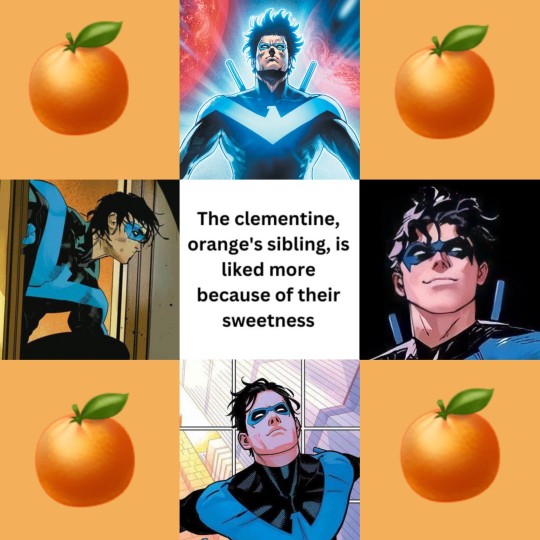
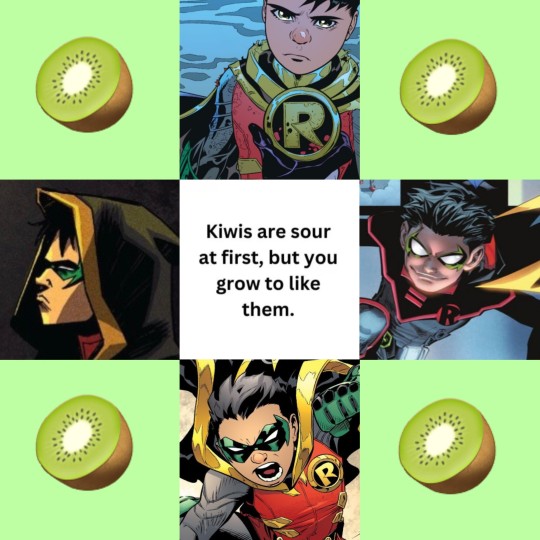
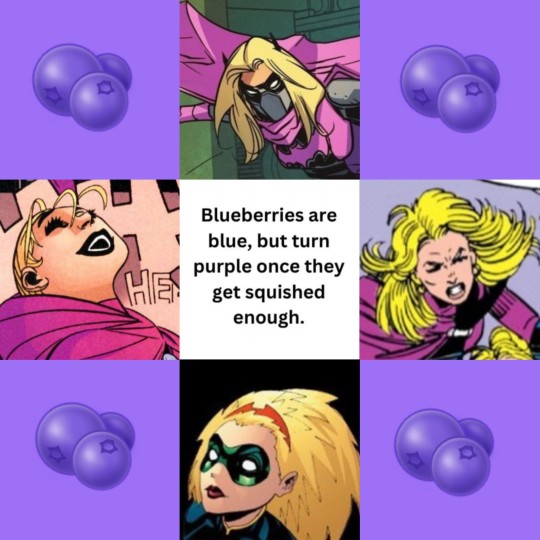


#dc#dc comics#comics#batfam#batkids#batfamily#batfans#jason todd#red hood#dick grayson#nightwing#damian wayne#robin#stephanie brown#spoiler#duke thomas#the signal#cassandra cain#batgirl#black bat#orphan#the red hood#the spoiler#signal#media analysis#angst#character analysis#comic books#comic characters#batman characters
106 notes
·
View notes
Note
hello would. you like to elaborate on. ford pines osdd. ((because I recently got diagnosed and. blorbo moments. but also because I love the idea in general. ford "I feel like I've lived 50 different lives" pines.))
so, first off, I want to apologize for putting this off for so long. I think it's been a couple of weeks at this point but I'm not entirely sure. Anyway, after getting this ask I immediately got really really excited and started outlining what I quickly realized was going to be a monster of an analysis post.
So much so, in fact, that I ended up having to move it all into a google doc. whoops.
As it turns out, this ask ended up being the thing to motivate me to go over a lot of other related thoughts about GF’s writing that I’d had stewing in my brain for ages, so you're getting an essay that you probably didn't sign up for. Again: my bad. I hold the champion's title for being the most long-winded autistic bitch to ever live.
Either way, as you might have guessed, I would love to elaborate on Ford Pines' hypothetical OSDD.

[content warning: I’m going to be talking about both fictional depictions and IRL patterns of interpersonal abuse in here quite a bit. Proceed with caution if you’re easily triggered by these topics, especially if you decide to look further into anything I mention here that isn’t strictly related to, y’know, the cartoon.]
#gravity falls#character analysis#uhm. nervous to put any of my analysis in the main tag but it's okay. it's fine#lab notes#askbox#you can reblog this btw. I did end up putting a lot of work into it as you might be able to tell.
130 notes
·
View notes
Text
Here’s one of the smaller details in dead poets society that I think gets slept on. In the scene where Cameron is talking to Neil about Todd he says “your new roommate looks like a stiff.” And then Todd walks in and he says “oops.” And walks away. Here’s what I find interesting about this scene: Neil is the only person vaguely nice to Cameron in the entirety of the movie. So naturally, Cam thinks Neil will have his back. But as the plot progresses, we watch Neil fall in love with Todd. He didn’t agree nor disagree with Cam in that first scene where they’re together. Because he doesn’t know Todd yet. Cam on the other hand is outwardly judgemental towards almost everyone. I honestly think Cam doesn’t deserve all the hate he gets. My HC is that he’s a scholarship student. His parents are poor and he’s worked his whole life to get to Welton. But no one knows this. So when Cam snitches , it’s to protect himself yes but I think it’s also to make his parents proud. Cam in my mind is a closeted gay or aromantic who just cannot process his feelings in the world the poets live in. So when he sees Neil and Todd, he’s jealous. He knows they had the life he’ll never be able to have. In the end DPS is a story of expectations and the paths we’ve been forced to take. Doesn’t everyone act in their own self interest at first?
65 notes
·
View notes
Text
It's Soap Saturday so I bring you a(fairly scattered) Soap analysis
"Oh she only has OCD and no more she's written badly" I HAVE OCD AND WHILE THAT DEPICTION WAS EXTREMELY DAMAGING AND COULD'VE BEEN DONE BETTER, IT'S UNFORTUNATELY ACCURATE FOR SOME PEOPLE(it's me I'm some people). SHE OBSESSES OVER EVERYTHING AND BEING A SOAP BOTTLE PROBABLY DOESN'T HELP SINCE OBJECTS ARE EXPECTED TO ACT ACCORDING TO THEIR OBJECTS
She can't HELP IT!!! SHE TRIES TO GET BETTER BUT LETTING GO OF YOUR HABITS IS DIFFICULT ON YOUR OWN AND AGAIN, AS A BOTTLE OF SOAP, SHE PROBABLY FEELS MORE SOCIETAL PRESSURE TO BE GOOD AT CLEANING!!!! SHE FIXATES ON EVERYTHING BECAUSE IT'S ALL SHE FEELS LIKE SHE CAN DO TO HAVE ANY CONTROL OVER THE SITUATIONS SHES IN!!! Besides cleaning, she has ONE coping mechanism, and it's one that everyone else HATES(singing). So no WONDER she ends up just cleaning. For hours. And hours. And hours. To the point where it's irrational
ALSO THAT'S ANOTHER THING!! Having control over situations is very big for me, and fixating is one of those things that helps. For Soap, being in a clean space and cleaning the hotel helps her feel like she can actually be calm and helps control her emotions, because without her cleaning? The hotel would be in shambles! If SHE wasn't helping, then everything would fall apart!! Sure, this isn't reality, but for her? Someone who has tried again and again to make things better but just making them worse BECAUSE of her impulses? She needs to feel like she's doing SOMETHING or else she's nobody. Just another stereotype ignored by the narrative
It's not HER FAULT that she has OCD and it's not HER FAULT that societal pressures force her to be who she is. Besides, after Tissues got eliminated, she could've thought that SHE had a higher winning chance because he got eliminated for his trait being. Well. Sick. So, as the opposite, the fans should love her!! Right? So, she goes further, she puts soap on the pizza, she has a musical number while fixing the hotel, she does all of these things to not only give herself a sense of stability, but also to hopefully boost her appreciation from the audience
And it didn't work
The moment she STOPPED cleaning, it didn't work. She told Mic to listen to her heart when walking through the portal, but if we're being honest(and if we see the comics), she went right back to cleaning. The moment she tried to be less impulsive, she was eliminated. And there goes her control once again
As of now she's likely right back in that loop, cleaning endlessly despite being asked not to as it isn't needed, but she won't, because if she's not CLEANING, then she doesn't have a purpose. She can't just pick up a new hobby, this is her LIFE, and if she can't sing, then she only has one option left
Or maybe I'm just reading too much into a one note character, who knows
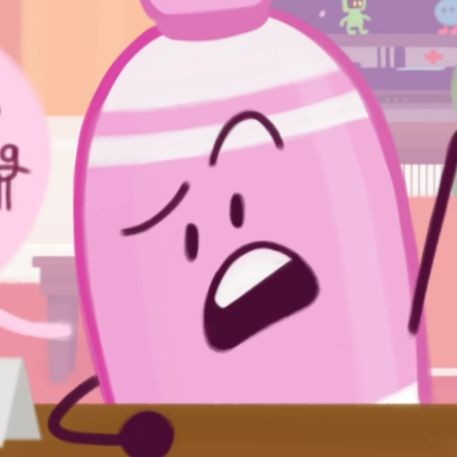
Happy Soap Saturday
#Soap Saturday#inanimate insanity#ii#character analysis#soap ii#ii soap#this was written by the self-proclaimed 1 Soap fan#textcorner#textpost
55 notes
·
View notes
Text
Idk if I already screamed about this but I'll do it again. The way Childe realizes there was a disconnect between his opinion (or what he'd been told) about Arlecchino and the reality her kids live in, and then IMMEDIATELY jumps on the opportunity for more information.
He's a smart lad! He's sitting around getting juiced up by a child without adult supervision like "this isn't how kids act when their father is insane and evil. What gives?"
(also that these kids are alarmingly similar to his own siblings and that he can't keep his head in the sand about how much he cares. They're not faceless Hearth soldiers anymore. He's invested)
So he goes up to Alrecchino later and the Traveler is conveniently there to give him extra leverage, so he just starts asking Arlecchino questions! And he threatens her!! Because while he is willing to change his mind, he's just gotta let her know that he cares about those kids and Will fight her about them.
Which in turn, massively improves Arlecchino's opinion of him! I feel very strongly that she wants people to see her as an antagonistic force against her own children so they're more likely to support the kids. The whole "omg your dad sucks. I'm here for you whatever you need." So, when Childe threatens her, she's like "Ah. You're doing exactly what I had hoped you would."
I forget if he threatens her before or after she actually starts answering questions. I think the theory stands either way, but there's more evidence if she gets much more forthcoming AFTER he threatens her
Idk. It's a huge mark for a character's intelligence that they can piece together THEMSELVES that their ideas are wrong and then go out and correct them.
54 notes
·
View notes
Text
So, I've noticed a few things about Sir Pentious' blimp and how it's built.
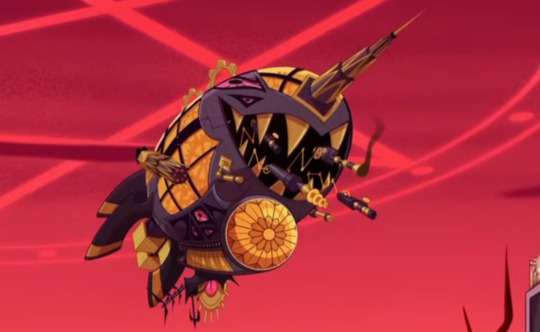
Its main window is all circular, and if you look at how it's structured, it resembles a flower. Specifically, a window like this is often seen in churches, and they're called "rose windows"
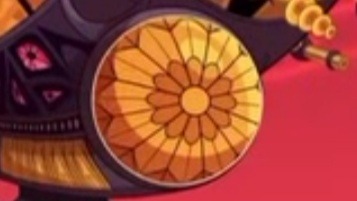
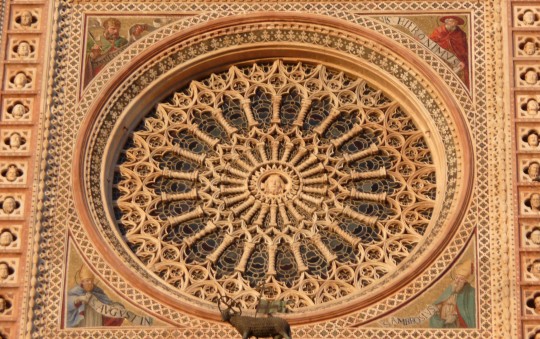
Then, the windows on the side: it's like they're made of stained glass. And, what do you know? They're also found in churches!
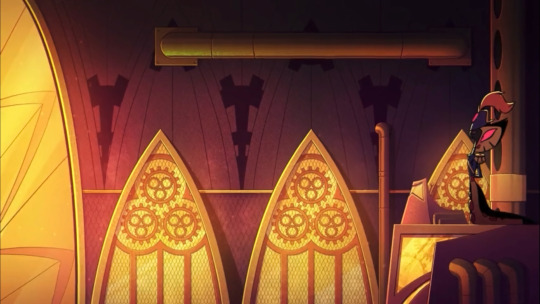
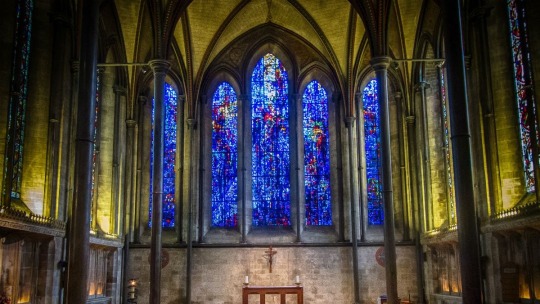
And finally, the ship has a pointy extreme on its frontal area. It actually looks like a spire, aka the highest architectural element in a church.
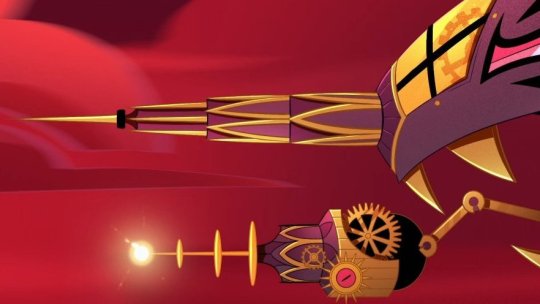

So basically, this blimp contains elements that evoke the place where everyday people come to confess their sins and become better people and be able to eventually ascend to Heaven.
Sounds familiar?
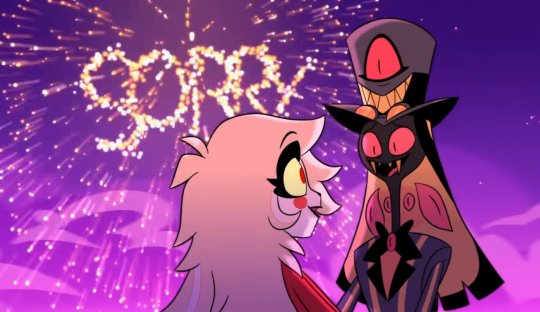
Notably, a certain Sinner, who happens to resemble the Biblical representation of sin and evil (the snake), became a martyr and ascended to Heaven by using this machine of destruction to save his friends with no guarantee he'd be able to survive such an action.
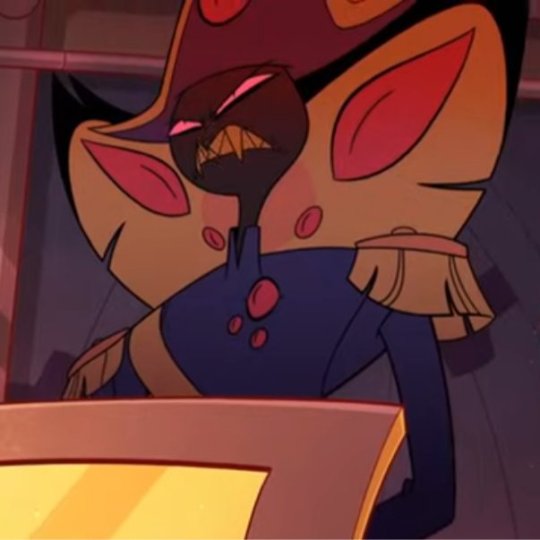
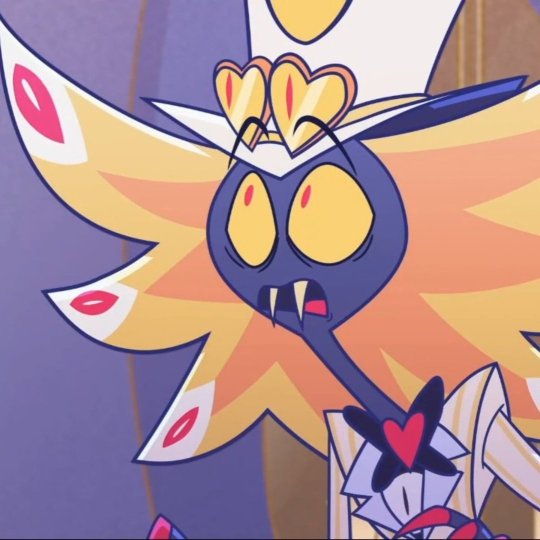
Such an act of self sacrifice to help beloved ones is seen as the ultimate form of love and virtue, and it fully explains the brilliance and plot reasons behind his blimp's sacral architecture.
"Greater love has no one than this: to lay down one’s life for one’s friends." (John, 15:13)
#Guys Sir Pentious has so many details to him that foreshadow his redemption I can't believe it!#Vivziepop#Hazbin Hotel#Sir Pentious#Fave Character#Comfort Character#Architecture#Church#Churches#Christianity#Personal Rambles#Character Analysis
66 notes
·
View notes
Note
So what do you the story would have been like if Jaune got removed? Like he was never a character.
Alright...
If Jaune was never a character, then I would assume none of Team JNPR would be characters. Following the story, we have Team RWBY going to Beacon and making it to the end of initiation with only the Nevermore fight. Aura is never explained, and we move along to Jaunedice, where we have the bully arc of Velvet getting tormented by Cardin. Blake comments about how terrible it is and maybe Ruby tries to step in to help, only to get shoved away because Cardin is bigger. Ruby and Cardin get into a fight and maybe Cardin tries to blackmail Ruby. This is resolved either by her coming to her team or by her showing that she's leagues above Cardin as a huntress and threatens him to not bully anyone ever again. And then Volume 1 continues the same as it did in canon.
Overall... A pretty alright show, nothing stellar. However, I feel like people writing off Jaune as a "useless" character that serves no purpose miss out on some pretty important moments in the series, like ESTABLISHING AURA. And yeah, sure, you could wave it off as something that could have been explained with or by someone else, but Jaune is supposed to be the John Everyman character who's thrown into the series with barely any knowledge like the other members of the cast.
So yes, Jaune Arc is an important character.
45 notes
·
View notes
Text
Thoughts on The Ghoul
So I think all the characters in the Fallout show are spectacular, but I had some thoughts on The Ghoul/Cooper Howard in particular that I just wanted to put down. Owing to his 200+ years of history, he's a downright fascinating, dynamic character, and I can't wait to see what they do with him next.
Anyway, here's my thoughts/character analysis of The Ghoul:
One of the things I found most interesting on my second watch-through of the show was how everything The Ghoul does is motivated by ruthless pragmatism, not cruelty. It can appear like cruelty--sometimes it tips over into cruelty--but cruelty is not the point. The point is always survival. He must survive to find his family. That is his goal and his one guiding tenet. Nothing else matters, everything else is fluid. Whatever it takes to survive.
Getting rid of the three bounty hunters who dug him up? Survival. Two of those guys were already one twitch away from killing him on the spot for being a ghoul, and the other threatened to harm him if he didn't show enough gratitude. Coupled with some of the other things he was saying, it seemed possible he would double-cross or kill The Ghoul the moment it suited him. No doubt The Ghoul has worked with the type before, and knew trouble when he saw it.
In Filly, he only shot people who were shooting at him. Cooper loves dogs, but he stabbed CX-404 because she was actively trying to kill him. On the surface, he healed her for equally pragmatic reasons: she could lead him to Wilzig. But he also seemed to respect, too, that she clung to life despite her debilitating wound. She's not his dog Roosevelt, so he tries to maintain a cold detachment from her (at first), but he has a soft spot for dogs.
He was willing to shoot Lucy in Filly, but he hesitated--which is more than he did for any of the other people threatening his life. Possibly he wouldn't have killed her (she was armed with a non-lethal weapon) until Maximus showed up on the scene and changed the calculus (dispatch the girl and deal with the newer, bigger threat without having to worry about her finding a lethal weapon and killing him with it). He didn't kill Maximus when he had the chance, either. He didn't need to. Maximus had already shown himself to be incompetent with the power armor. It was simple enough to damage the power armor and watch him tuck tail and run.
When he meets Lucy again, he uses her with the same casual, indifferent efficiency as he would any other tool. The point of dunking her in the water was to lure the gulper. It had the unfortunate side effect of also being torturous for Lucy, but the cruelty wasn't the point. Getting the head back was. The head=caps, caps=meds, meds=survival, survival=eventually find family.
We don't know what The Ghoul would have done if they had retrieved the head from the gulper and his medicine hadn't been destroyed. Probably it would have depended on what Lucy did. If she seemed likely to come after him and the head, he probably would have killed her or incapacitated her and left her for dead. If she had explained she needed to trade it with Moldaver for her dad, Hank MacLean, hoooo boy, he would have beelined for Moldaver's with Lucy in tow. Whether Lucy came along as his partner or his captive/extra bargaining chip would also probably depend on Lucy's behavior.
But they lose the head and The Ghoul's medicine is destroyed. The math changes. He can come back for the head, but he needs meds now, which means he needs caps now, and the only thing of value he has on hand is this pampered girl from a fucking vault who seems patently unwilling to do the things that need to be done to survive in the Wasteland anyway, so if she's gonna die, he might as well profit from it. He needs meds to survive. He needs caps for meds. It's simple, brutal math.
While he's hauling her to the Super Duper Mart, though, he does several interesting things that are degrading for Lucy, yes, but are simultaneously teaching her how to survive the Wasteland, testing to see if she'll adapt. First, he mercy kills Roger and butchers him. It's important to note that The Ghoul didn't have to take a detour from his all-important mission to obtain medicine--he could hear it was Roger, he could tell Roger was going feral and didn't have any meds-- but he went anyway to help ease an old friend's passing. And he made sure Roger's last thoughts were pleasant, too.
Then, because this is the Wasteland and the one law is survival, he wastes no time switching gears. There's no waste in the Wasteland, and a fresh dead body presents an opportunity for those willing to seize it. The Ghoul, mind you, has had 200 years to learn that he can't be picky. Ghouls are unwelcome in most "civilized" parts of the Wasteland, barred from the simple comforts and safeties and securities that other people can enjoy if they reach those scattered, precious oases. The Ghoul has had to eat people. It sucks, but it's that or die.
But Lucy doesn't understand that. She arguably doesn't understand what a ghoul even is because nobody's taken the time to tell her. She doesn't know what the last 200 years have been like. She's appalled--and then she has the audacity to voice her disgust. The Ghoul hands her the knife to keep butchering Roger in part to humble her, to drag her down into the dirt with the rest of them, but he's also teaching her a stark reality of the Wasteland. It was a lesson and a skill that he had to learn the hard way. (Interestingly, while nearly everyone in the Wasteland is disgusted by cannibalism, it's also a known thing that happens all the time. The Ghoul and Lucy are in the interesting position of being some of the only people in the Wasteland who were raised in societies where cannibalism truly was unthinkable).
On the walk to the Super Duper Mart, he refuses to give her water. On a pragmatic level, there's no reason to waste water on the equivalent of a dead woman walking--he's leading her to get her organs harvested, after all. (He is pretty petty when he pours out the last drops instead of giving them to her, though). But also, whether he is actively intending to or not, he is teaching her to adapt to Wasteland conditions. The water in his canteen, in fact, was just as irradiated and gross as the standing water from which Lucy ultimately drinks; he refills his canteen from the same rusted-out vessel Lucy drinks from, and likely drew the previous canteen's worth of water from a similarly unpalatable source. This is water in the Wasteland. Drink it or die.
When she runs away shortly after, he lassos her (and, sidenote: can I just add how fucking cool it is that they actually carry through his lasso skills? Like, that is actually an extremely useful skill and the writers utilized it!), which leads to that pivotal scene where she bites his finger off and he takes hers.
This is interesting for multiple reasons. The Ghoul calls her a "little killer" and seems satisfied to see her finally fighting with the same savagery as a Wastelander. This could be either because a) he believes all people have a killer lurking beneath the facade of civility ("I'm you, sweetie. Just give it a little time...") and she's finally found that steely will to survive no matter what it takes, and/or b) he believes she's been faking her doe-eyed, good girl persona. He's the one who first finds Wilzig's body, after all. To him, it looks like Lucy lured the doctor off and ruthlessly chopped off his head before running off with it. Maybe she's just a really good actress, and in biting his finger off, she's let that mask slip.
Either way, he introduces her to another law of the Wasteland: don't dish it if you can't take it. She takes his finger, he takes hers. He doesn't kill her for it, in part because that would be disproportionate, in part because that would be a waste (he probably needs he alive to exchange her for caps). But also, from a practical standpoint, she just bit off his shooting finger. Unbeknownst to her, ghouls can reattach body parts, even ones that are not their own. He's harvesting his replacement from her. If he wanted to be cruel, he had ample opportunity to be cruel here. He could have taken more fingers. He could have hurt her in ways that wouldn't have affected her value to organ harvesters. He could have degraded her and called her all kinds of nasty names. But he doesn't. He's efficient. If anything, he seems almost proud of her for abandoning her hoity-toity principles and fighting back.
He still needs caps. He's feeling the effects of not having his medication. He's still committed to delivering her to the organ harvesters. In his mind, he has no choice. This is about survival. He has to survive to find his family. This is the option he has available to him. This is how he lives to see another day. He brings her to the Super Duper Mart and, drawing deep from that actor's well, he maintains the tough-guy routine long enough to intimidate her inside, then he succumbs.
He's still down when Lucy re-emerges, victorious, and he knows, he knows that he's dead. He tried to kill her, now she'll kill him. It's the smart thing to do, the practical thing to do. Another law of the Wasteland...
But she doesn't do it. She has all the power here, she knows he's a dangerous element, that she would probably be safer if she left him for dead or killed him herself. But she breaks all the rules. She gives him, freely, generously, with supreme dignity and a selfless kindness he had long forgot, an abundance of the thing he needs to survive, the thing he was willing to sell another human being for no questions asked. Just like that.
There's also something to be said here about how resource scarcity (and the removal of that scarcity) affects people. As soon as The Ghoul gains a cache of at least 2 months worth of medicine, it frees him from the basic math of mere survival. He has room to breathe and think long-term (at least by Wasteland standards). He can reflect on the momentous thing that just happened to him, too. As he watches himself on the TV in the Super Duper Mart, watches the man he once was unwillingly (and unwittingly) take the first step onto the path to what he has become, he remembers what it was like being Cooper Howard. Why he, Cooper Howard, hated the "feo, fuerte, y formal" scene so deeply.
Cooper Howard was a kind, moral, and dignified man who seldom said an unkind word. He was a loving husband who deeply respected his wife and absolutely adored his daughter. Though his naivety, privilege, and ignorance blinded him to the ugly realities of the pre-apocalypse world around him, he valued justice, freedom, and equality. He wanted the characters he played in the movies to reflect that belief in the power of the law and respect the innate humanity of all people, even the villains. And, when he began to see the cracks in the perfect picture of his charmed life, he is driven to know the truth behind the facade. His deep, defining belief in justice and truth would not let him leave it alone.
Cooper Howard learned the truth that Vault-Tec (and by extension, his wife) were willing to drive the world off a cliff, and it destroyed his marriage and deeply affected him. Even then, demoralized and hurt as he was, he found it in himself to be thoughtful and kind to his daughter and the people, both adults and children, at the birthday party he worked the day the bombs dropped. Fundamentally, he was still a kind, moral man. And that kind, moral man found himself in the middle of the most horrific nightmare anyone could ever imagine experiencing: the death of the planet under a rain of atomic bombs. Then he lived through it and had to contend with the harsh realities of surviving on the annihilated landscape left behind. Fortunately for him, he already had several handy skills to carry him through: having formerly been a real cowboy, he knew a thing or two about surviving in tough conditions; having formerly been a soldier, he knew what it took to kill a man and had the experience and fortitude to do it; and finally, having formerly been an actor, he had a built-in psychological coping mechanism to insulate him from the horrors of the things he needed to do to survive.
Cooper Howard used to put on and take off personas for a living. Sure, he played white hats, but he had an intuitive understanding of character and narrative tropes. He played opposite some of the best bad guys in 21st century Hollywood! It wouldn't be hard for him to pull the cloak of acting around himself to do what he initially needed to do to survive. But somewhere along the way, the tough, ruthless persona he adopted stopped being an act and he became his character. He embodied the answer to the question posed by The Man from Deadhorse: what happens when a good man is driven too far?
Cooper Howard adapted to survive. His actions reflect the realities of being a ghoul (again, a people generally reviled by everyone and cast out of safe havens because they are deemed threats). Pragmatic and efficient violence are necessities if a ghoul wants to live long, stay sane, and stay out from under the thumb of would-be enslavers. Still, beneath it all, Cooper Howard is still there, buried deep down beneath the character-persona of The Ghoul.
The Ghoul is drawn to Lucy (platonically, romantically, or some secret third thing), to her goodness and old-world manners just as much as he is disgusted/irritated by them. She's an echo of himself, of Cooper Howard, of who he used to be, and he knows EXACTLY where that gets a person. She's going to get herself killed if she doesn't wise up. With those high-and-mighty, anachronistic principles, that black-and-white worldview, her totally naive misunderstanding of the realities of the Wasteland, she won't last long. And initially he sees her as a pawn, like he was, only good for moving him one step closer to his goal. But then she shows him she can adapt and survive. Not only that, she can be true to her core principles in the process. She can conduct herself with dignity. Lucy reminds him what it was like being the white hat, and shows him that yes, even in this hellscape, there can be heroes. Over 200 yeas, his pragmatism and need to survive sanded away the nuance between Good and Bad. But Lucy makes him reconsider whether maybe there is right and wrong after all, and maybe it actually does matter.
Thus begins his transformation, but the change is not immediate, and this is still the Wasteland. He escapes from The Govermint and goes after Lucy. To do that, he needs to find Moldaver. He tracks down someone who might know where to find her, kills him and accidentally blows a hole through the letter with the key bit of information he needs to find Moldaver. So, he goes to that guy's family to find the man's younger brother, Tommy. When he gets the information he needs, he kills Tommy. He gives Tommy the opportunity to back down, but The Ghoul has a lot of experience and reads Tommy like a book. Tommy is not the kind of kid to let something like this go, and The Ghoul has clearly been burned by leaving vengeful people alive before. Tommy reaches for a gun to shoot The Ghoul, and The Ghoul doesn't hesitate. He blows a hole in the kid. It sucks, but again, this is a decision born from sheer practicality, not love of carnage.
Later, he comes across CX-404 trapped in a Nuka-Cola machine (left there by Thaddeus). The head is lost to both of them now; the dog cannot help The Ghoul with finding it. But he saves her anyway and dubs her Dogmeat. He lets sentimentality get to him for the first time in who knows how long and allows himself to bond with another living being. When he does reach The Observatory (where Moldaver, Lucy, and her dad are), he clearly stashes Dogmeat somewhere to keep her out of harm's way and goes in after Lucy.
After fighting his way through the Brotherhood of Steel, we come to that pivotal scene where Lucy finds out about her father's history. Cooper hangs back to observe and learns that his niggling, hare-brained hunch about Lucy and her last name was correct: she was the daughter of Henry MacLean, a man-out-of-time who presents the first real step in 200 years toward Cooper's ultimate goal: finding his family. (I think it's important to note, however, that he isn't 100% sure of her connection to Hank when follows her to Moldaver's--his reasons for going to the Observatory are either to get information from Moldaver or simply to back Lucy up, should she need help). He lets Hank get away so that he can follow him, and he's willing to follow him alone. But now there's Lucy, who is as wrapped up in this shit as Cooper is (even if she doesn't understand it yet), and he figures they both deserve answers. She's shown that she can adapt to survive, she just needs a teacher. In their first exchange since she left him at the Super Duper Mart, he treats her with new respect and offers her the opportunity to come with him, learn from him, and find out about who she really is and the legacy that has produced her. But perhaps he also knows deep down that he needs to learn from her too. He needs to remember what it was like to be good, to be human. He needs it so he can be it for his daughter when he finds her.
So, yeah, I don't know, it's just interesting how Cooper Howard became essentially lost in method acting a villain to survive the fucking awful conditions he found himself in, but even then he isn't cruel. Like, there are a lot worse things he could have done to Lucy. A LOT WORSE. As far as I can tell, he never looks at or touches her in a creepy, predatory way. Yeah, he drags her around on a leash and cuts her finger off when she bites his off, but that's pretty damn tame for the Wasteland. He secures her with rope, but otherwise is pretty hands off with her. If he objectifies her, it's in an extremely non-sexual way. More of a taking-the-cow-to-market kinda way. Which still sucks, but again, it's not needlessly cruel or wantonly violent, which is pretty impressive given general Wasteland behavior.
He's a damn interesting character, and I'm super stoked to see how he develops--and how he interacts with Lucy going forward.
#fallout show#cooper howard#the ghoul#lucy maclean#long post#character analysis#also#have you guys noticed#Cooper is wearing the same hat shirt and trousers he wore when the bomb dropped??#how has he NOT worn out those clothes after 200 years??#how does he take care of them??#Why does he wear them still?#...do you think it's so that when he does find his daughter#she'll be able to recognize *them* even if she doesn't recognize *him*?
34 notes
·
View notes
Text
Ok I wanna talk about Ethari's clothing/design over all. His clothes and tattoos are different from every other Moonshadow elf we've seen, and he's one of the few that doesn't wear braids. Like:
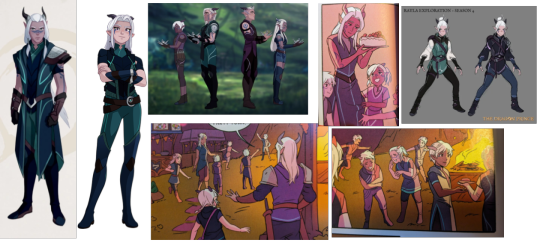
The recurring elements are intricate patterning; over layers and under layers; multiple colors in the same garment (or at least same outfit); wraparound construction, color contrast between mediums, lights, and darks; and the dominant color is always the medium, never the lightest or darkest color (usually navy, true black is very rare outside of the assassins). Even arc 2 Rayla follows most of these rules and she's been away from her culture for two years!
But then we have Ethari:
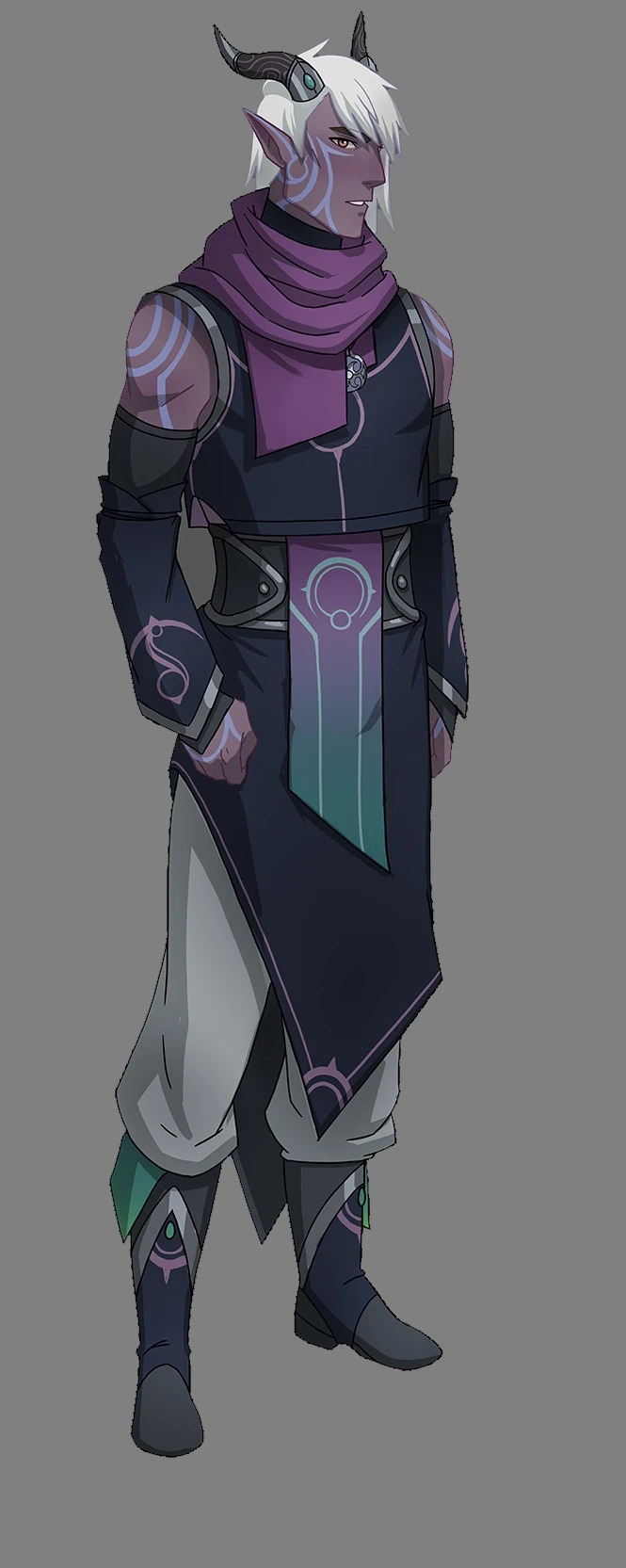
He doesn't have an outer layer, he wears almost solid navy, none of those clothes are wraparound, he has no light color, there's not a lot of contrast, and his dark color is true black despite not being an assassin. He bends all the rules, though he only breaks one completely. He still has that patterning, but it's minimal compared to the others. He has plenty of accent colors, more than anyone else actually, but they show up on him far less. He does have light, medium, and dark colors, but his whole pallet is darker than everyone else's. The only rule he 100% breaks is the wraparound construction
A lot of this probably derives from the fact that he's a metalsmith:
For the most part his clothes quite are practical;
Black/navy hides coal dust/soot very well. It gets everywhere, on your pants and face especially, and is highly visible on just about every other color.
Forging is hot work & you do it next to a fire that needs to be at least 1000° celsius, I never wear more than one layer either.
those sleeves, while a bit looser than I'd be comfortable with, probably aren't going to get in the way. Plus I heard somewhere that they're spelled to repel heat (couldn't find if that's actually canon tho), so if that's true they're much better than my gloves.
The crop top isn't great but he's got that belt to stop most embers. Besides he's probably not the type to yelp every time one lands on him like I am.
if he pulls the scarf over his mouth & nose it'll help delay him getting lung cancer in the death trap of a smithy Wonderstorm designed for him (my problems with it are a post all on their own. I have nothing against the artists, its pretty, but by all rights he should be dead)
There might also be a cultural aspect to his clothing:
I think the navy blue, the arm bands, the boot decorations, and his belt & tabard could all be symbols that mean "I am a metalsmith" in Moonshadow culture. (Quick side note, he's not technically a blacksmith. historically blacksmith means specifically iron workers. If anything he's a whitesmith since he usually works with silver.) We see it with the assassins, why not metalsmiths too?
Plus if you take a look at his forge in the art book, there's a design carved on it that looks almost exactly like the one on his tabard. Elements of it also appear on other parts of his clothing:
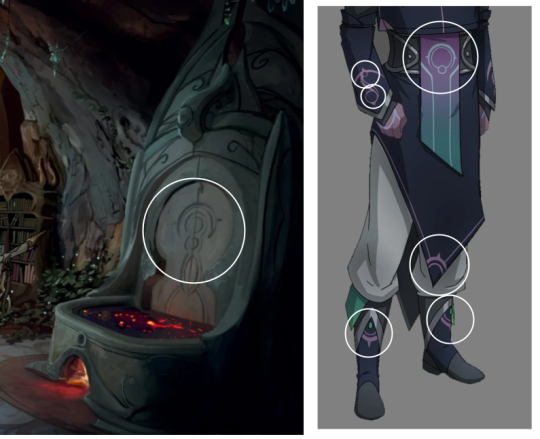
I suspect that this is some sort of symbol for metal working or fire protection. If he's in a guild it could be their symbol, or it could just be a wider cultural symbol. Either way it has a meaning that relates to the forge specifically. I couldn't find it anywhere else in the room.
I just realized that I never even brought up the metal hems on his sleeves. Then again what is there to say? It's metal, he's a metalsmith. It's pretty, he likes pretty things.
But what about the rule he completely breaks?
As I said, every moonshadow garment has some sort of wrap-and-secure construction to it-- except Ethari's clothes. I seriously doubt this is a metalsmith thing. Basic garment construction isn't a sensible way to differentiate your group within one culture. I fully believe Ethari is doing this on purpose. But why? That why gets even bigger when you realize that no other moonshadow elves we've met have brown eyes or periwinkle blue tattoos.
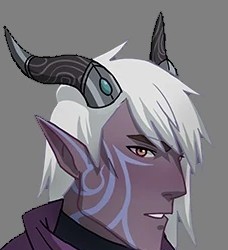
Put a pin in all that, I need to explain my interpretation of Moonshadow culture for this to make sense.
"Moon Primal creatures can be private and secretive, and are keenly aware of the power of appearances." - from the official website
"Moonshadow Elves obey a rather rigid, honor-driven culture." - from the wiki
To me this paints a picture of a fairly collectivist culture. They place a heavy emphasis on community and duty, two things that are usually more peaceful/simpler when you have cohesion within the group. Cohesion creates less conflict, less conflict makes your community more peaceful and your duty to it easier to complete.
But they know that this cohesion is- to an extent- only an act, so each person has a sub community where they don't have to act. Your inner self is for family and friends close enough to be family. (I honestly think they might have some sort of ritual to formally adopt friends as family) To everyone else you're supposed to put up a front that makes you seem more like everyone else.
OK back to the pin
Even without his clothes, Ethari is already visually different from everyone else. No other Moonshadow elves we've seen have tattoos or eyes the same color as his. It's a subtle difference but it is noticeable, and in a culture so focused on appearances people would notice. Most people's instinct would be to try to hide or downplay it, to prop up that front as much as they can. Yet Ethari doesn't put up a front, not to the extent that most people seem to. He's even accentuating his differences by dressing in a different style than them- and he's respected.
In my comm class the other day we were talking about groups, and one of the things that came up was that cohesion fosters sameness and diversity fosters innovation. Ethari is an innovator, it's literally his job. He invents the wingalings in bloodmoon huntress, Runaan and Rayla's weapons, and probably a bunch more stuff we haven't seen. Maybe for all they value appearances and fitting in, moonshadow culture still recognizes that people like him are important and they aren't as effective when they have to fit in. They can't be too out there (remember, Ethari only bends the rules rather than breaking them) but as long as they stay within a certain radius of the norm they can gain a lot of respect. I think this is what Ethari has done. The fact that his family (Runaan, Tiadrin, Lain) are all pretty traditional probably helped a lot. They keep him from pushing too hard on the edge of the box and he keeps them flexible.
That they aren't there anymore has probably exacerbated the rift between him and the rest of the silvegrove caused by Rayla's ghosting and whatever news has reached them from the storm spire.
I am so excited to see him in S6. I thought about adding some speculation about what his new design might look like, but I honestly don't think he'll have changed that drastically aside from his hair. My biggest question is honestly whether or not he's still in The Silvergrove.
Bonus:
I bet that some of Ethari's relative weirdness rubbed off on Rayla. She didn't have many friends as a kid so, when she wasn't in school or with the assassins, it makes sense that hung out with Ethari a lot. Since he's less strict than Runaan she was probably only comfortable completely unmasking with him. He heard about all her crushes, fears, and insecurities that Runaan didn't. Which goes a long way to explaining why Ethari was the only one who could see she wouldn't be a good assassin; she was hiding those traits from everyone but him.
This also explains some of why he was so willing to believe that she ran away. Ethari saw all of her vulnerability, but he didn't see all of her strength. While she was out training and facing her fears with Runaan, Ethari was in the smithy and only heard about their exploits after the fact. Neither of them saw all of who Rayla is, but both of them thought they did and had to find out that they were wrong in just about the most heartbreaking way imaginable.
#this started as me going “how actually practical are Ethari's clothes?” while I was forging that touchmark stamp#and spiraled out of control from there#also we're ignoring Redfeather because a) she was ghosted b) I didn't remember she existed when I started this#ethari#tdp#the dragon prince#tdp ethari#tdp meta#character analysis#rayla#tdp rayla
41 notes
·
View notes
Text
Beautiful and Foolish
My favorite scene from the manga is in the Campania arc, during Sebastian's flashback, when Sebastian realizes that Ciel is unlike any other human, and that his willpower and desire for revenge is stronger than his longing for the past. It sets him apart from all the other humans Sebastian has met before, and it makes him realize that his soul is a most delectable one.
Sebastian thinks that Ciel’s resolute will and undying strength makes him “beautiful and foolish”. What I admire about this scene is that it's the start of Sebastian's character development, and what sets him apart to how he was when he first made the contract with Ciel. He only wanted a soul to sate his hunger, but then he slowly realizes that this human is, indeed, special.
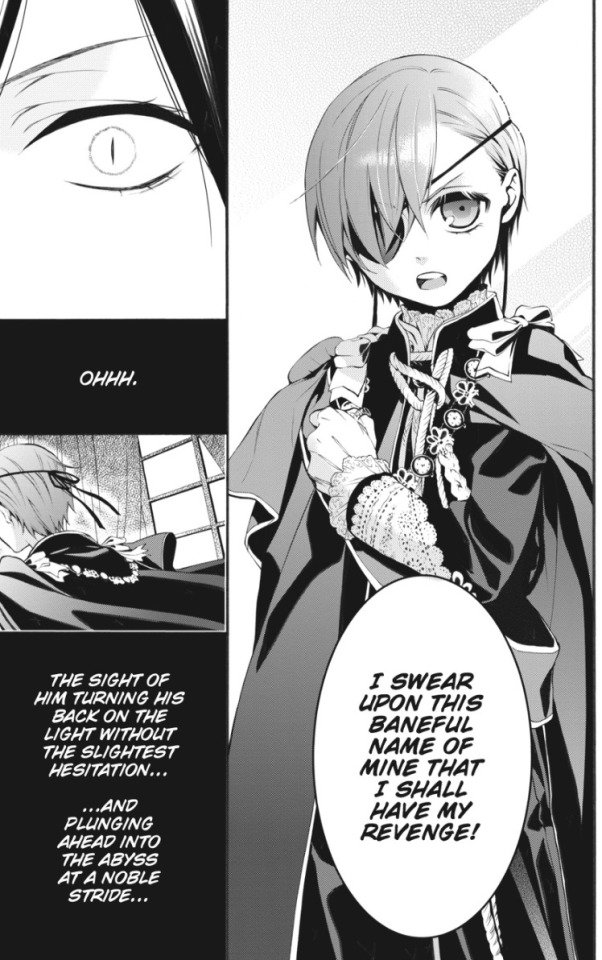


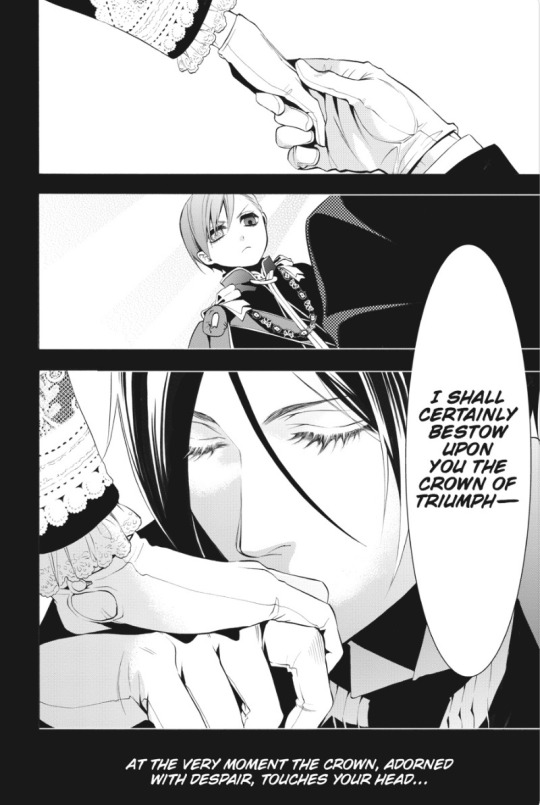

#kuroshtisuji#ciel phantomhive#Sebastian michaelis#character analysis#sebaciel#Kuroshitsuji meta#meta analysis
41 notes
·
View notes
Text
It's midnight and I'm awake like I got a charge of 2000 volts in my body so...
Hobie Brown yapping!
More so about his... morals? Possible beliefs? I don't know, something like that.
This one is more like a little headcanon of sorts? I don't know how to classify this tbh.
Anyways! We have the album for the movie on spotify, right? And in the spotify version (I never checked the others...) some of them have voice-overs from the film. And of course one of my favorites is Link Up and Silk & Cologne (both have Hobie voice-overs).
And even with the other songs with voice-overs, I can't help but think that it has purpose. Why would they throw a random voice-over of a random character in a song if not for the song to relate to them somehow?
See this one for example:

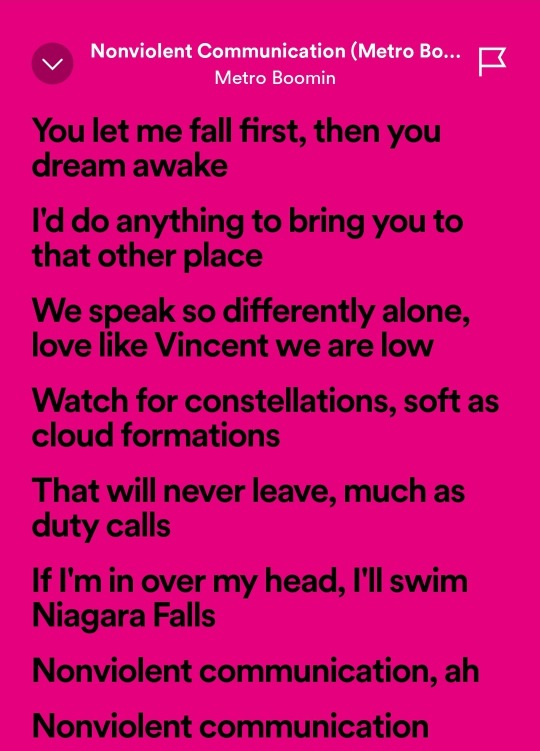

It has a Miguel voice-over at the end, and somehow I can see it fitting his story. He had nothing and found somewhere where he had everything, but still lost it.
Oh and what about this one?

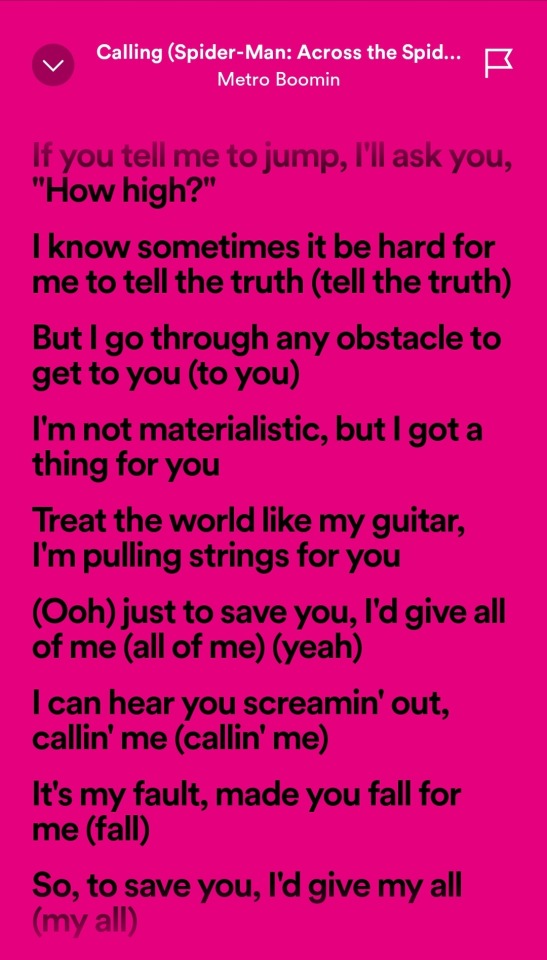

I don't know about you guys but this music screams desperation. Miles desperation to get to Gwen. And in the end we have Mr. Morales voice-over "Mini man, come on, drop the beat!" and when that happens? After he makes his speech and refers to Miles and he's simply not there.
THIS IS GETTING LONG BUT I THINK ITS CLEAR NOW SORRY 😭
About our beloved, we have this in Link Up:
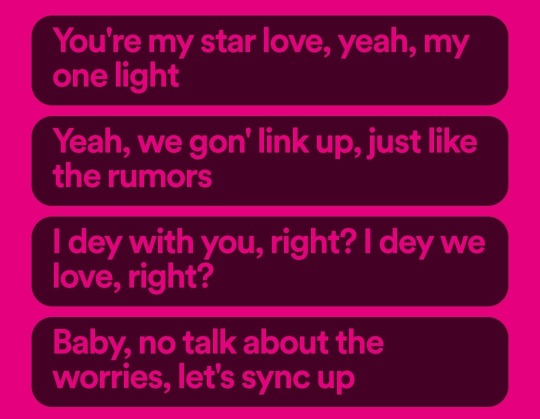
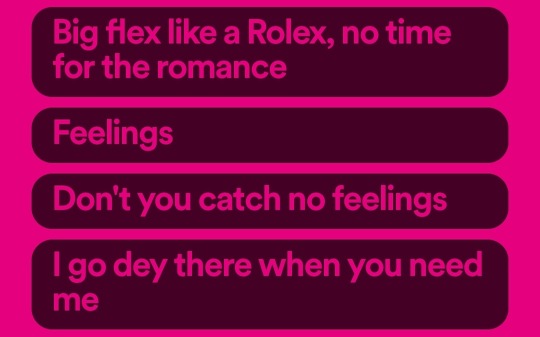
THIS JUST SPEAKS SO MUCH HOBIE TO ME I CAN'T— I'm not going for the "he hates labels so of course he would never call anyone partner!" bullshit. Shut yo mouth.
He does love, he does expect to have someone one day but "don't talk about the worries, let's link up"!! He's one to go with the flow!! No need to rush anything, feelings have to grow in order to be nurtured.
And Silk & Cologne? Just confirms that.

I need you close, don't go far drom me
And I feel better when you talk to me
So come and talk to me
He just wants someone to trust him and take this slow ride with him. At least that's what he expects from a partner – someone to be together without doubting things or rushing them. ( ´∀` )b
And that’s it, I just spend 30 minutes to ramble about Hobie and make silly connections with my silly brain. See you soon! BBYE! 🩷
#hobie brown#bleak posting#spider punk#across the spiderverse#atsv#hobie spiderverse#hobie thoughts#hobie brown headcanons#atsv hobie#astv hobie#hobie brown x reader#hobie x reader#hobie brown x you#thoughts#character analysis#i guess?#headcanons#hes a cutie patootie#anyway#goodnight#🫶
35 notes
·
View notes
Text

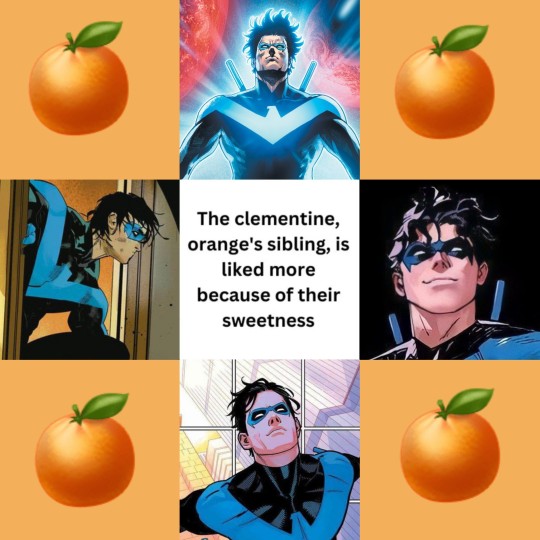
#dc#dc comics#comics#comic books#batfam#batfamily#batkids#tiktok trend#i made this#jason todd#red hood#dick grayson#nightwing#batbros#character analysis#angst#character angst#comic characters#batman characters#detective comics#batboys#my edits#richard john grayson#jason peter todd
119 notes
·
View notes
Text
I don't think kipperlily, specifically kipperlily, wants the bad kids to die in the specific way that would have the rage God (corrupted ankarna) give them the choice of worshipping her or staying dead. I think kipperlily Hates the bad kids more than anything. If she was sure they would all choose to stay dead, I'm sure she would do it. However, she would have to deal with the chance they would choose to come back. The rest of the rat grinders would probably think of this as a good thing, a group of powerful adventurers working towards the same goal as them, but kipperlilly? Kipperlilly would hate that more than anything. The bad kids being on the same side means that they are going to be what is focused on. They are the main characters, after all. If they are on the same side as her, she losses all the attention she Does have and is forced to be around and work with the people she believes had an unfair advantage in school. She wants attention, the bad kids will always be in the way of that. Imagine if they even had the attention that she wanted from her God.
#kipperlilly copperkettle#dimension 20 spoilers#fantasy high junior year#dimension 20#fantasy high spoilers#ramblings#character analysis
33 notes
·
View notes
Text
not a day goes by where I don’t think about the difference between s5e9 (mac and dennis break up) and s14e4/5 (the gang chokes/the gang texts) (or just s14+)
cause in s5e9, the whole episode is obviously centered around how dennis and mac fundamentally need and depend on one another, and that they’re complete and utter best friends. even when they argue, they make up properly, and it gets all wholesome at the end - but then in the later two, dennis is constantly snapping at mac, is irritated by him, and to put it really really harshly, seems like he hates him at points. and then on the other hand mac is unhealthily devoted to dennis. i know the change is really obvious and it’s literally a plot point, but thinking about that specifically makes me sad
#iasip#it’s always sunny in philly#it’s always sunny#it’s always sunny in philadelphia#macden#macdennis#character analysis#episode analysis#toxic yaoi#evil yaoi#mac mcdonald#mac iasip#dennis reynolds#dennis iasip#mac and dennis
26 notes
·
View notes